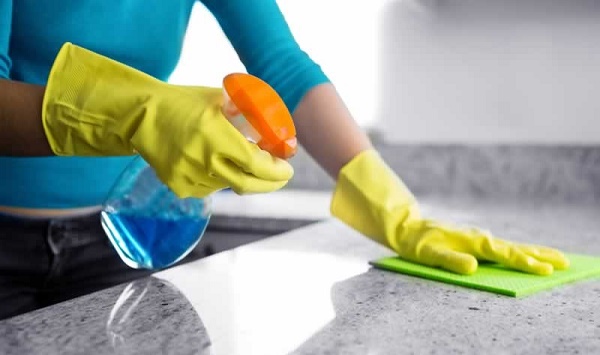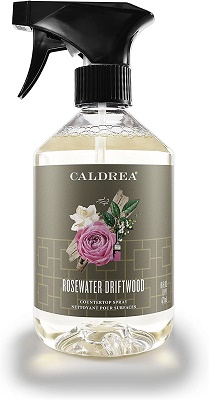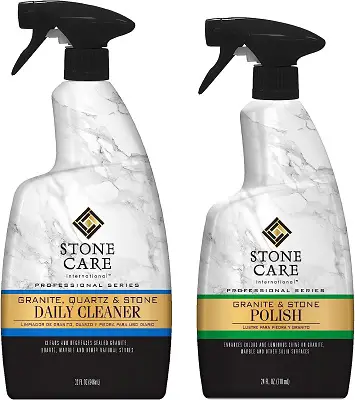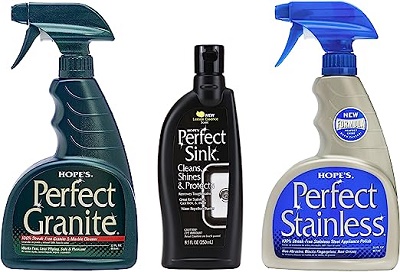Disinfecting Kitchen Countertops: Your Guide to a Clean and Germ-Free Surface
When it comes to maintaining a clean and healthy kitchen, disinfecting your countertops is essential. Kitchen countertops are frequently exposed to food spills, bacteria, and other contaminants, making regular disinfection crucial for the well-being of your household. In this comprehensive guide, we will walk you through the step-by-step process on how To disinfect kitchen countertops effectively. Get ready to achieve a sparkling and germ-free surface so that you can confidently prepare food.
Why Disinfection Matters
Kitchen countertops serve as a primary surface for food preparation, making it crucial to eliminate harmful bacteria and prevent cross-contamination. Regular disinfection not only removes visible dirt and grime but also targets invisible germs, including bacteria, viruses, and other pathogens. By disinfecting your countertops, you create a safer environment for food preparation and reduce the risk of foodborne illnesses.
Step-by-Step Guide on How To Disinfect Kitchen Countertops
Follow these steps to thoroughly disinfect your kitchen countertops:
1. Clear and Prepare the Surface
- Remove any items, utensils, or debris from the countertop surface.
- Wipe away loose crumbs or food particles using a dry cloth or paper towel.
2. Choose an Effective Disinfectant
- Select a disinfectant that is safe for use on kitchen countertops. Look for products that are specifically labeled as antimicrobial or capable of killing bacteria and viruses.
- Alternatively, you can create a homemade disinfectant by combining 1 part water with 1 part white vinegar or hydrogen peroxide. These natural solutions are effective against many germs.
3. Apply the Disinfectant
- Spray the disinfectant directly onto the countertop surface, ensuring complete coverage.
- Pay extra attention to high-touch areas, such as around the sink, stove, and food preparation areas.
4. Let it Sit
- Allow the disinfectant to sit on the countertop surface for the recommended amount of time specified on the product label. This allows the disinfectant to effectively kill germs.
- If using a homemade solution, let it sit for at least 10 minutes to ensure proper disinfection.
5. Wipe and Rinse
- Using a clean, damp cloth or sponge, wipe the countertop surface, ensuring all areas are thoroughly cleaned.
- Rinse the cloth or sponge frequently with clean water to remove any residue or disinfectant.
6. Dry the Countertop
- Use a dry, clean cloth or paper towel to dry the countertop surface completely.
- Moisture can promote bacterial growth, so ensure the countertop is completely dry before using it.
7. Extra Tips for Specific Countertop Materials
- Granite, Marble, and Natural Stone Countertops: Avoid using acidic or abrasive cleaners that can damage the surface. Stick to gentle disinfectants and mild soap.
- Laminate Countertops: Be cautious with excessive moisture as it can cause the laminate to swell. Wipe dry promptly.
- Stainless Steel Countertops: Use a stainless steel cleaner or a mixture of mild dish soap and water to disinfect and restore shine.
Maintaining Clean and Germ-Free Countertops
To keep your kitchen countertops clean and germ-free on a daily basis, follow these additional tips:
- Clean up spills immediately to prevent staining and bacterial growth.
- Regularly wipe countertops with a damp cloth to remove dust and debris.
- Use cutting boards and food-grade mats to protect the countertop surface from scratches and stains.
- Avoid placing hot pans or pots directly on the countertop to prevent damage.
How to choose the best kitchen countertop cleaner
Keeping your kitchen countertops clean is vital for maintaining a hygienic and visually appealing space. With numerous cleaning products available on the market, finding the best kitchen countertop cleaner can feel overwhelming. In this expert guide, we’ll help you navigate through the options and find the perfect cleaner to ensure your countertops stay spotless. Get ready to discover effective cleaning solutions that will make your kitchen shine.
How To Increase Water Pressure In Kitchen Sink
Understanding Your Countertop Material
Before diving into the world of countertop cleaners, it’s essential to understand the material of your kitchen countertops. Different materials have specific cleaning requirements to prevent damage and maintain their pristine condition. Here are some common countertop materials and their recommended cleaning methods:
- Granite and Natural Stone Countertops:
- Avoid abrasive cleaners that can scratch the surface. Opt for gentle, pH-neutral cleaners specifically formulated for stone.
- Wipe spills immediately to prevent staining.
- Seal the countertop periodically to maintain its natural beauty and durability.
- Marble Countertops:
- Use a mild, non-abrasive cleaner specifically designed for marble surfaces.
- Avoid acidic cleaners, such as vinegar or lemon juice, as they can etch the marble.
- Wipe spills promptly to prevent staining.
- Quartz Countertops:
- Clean with a non-abrasive, gentle cleanser or mild dish soap and water.
- Avoid using harsh chemicals or abrasive scrubbers that can damage the surface.
- Wipe spills promptly to prevent staining.
- Laminate Countertops:
- Use mild dish soap and water or a non-abrasive, all-purpose cleaner to clean laminate surfaces.
- Avoid abrasive scrubbers that can scratch the laminate.
- Dry the surface thoroughly to prevent moisture-related issues.
- Stainless Steel Countertops:
- Clean with a mild stainless steel cleaner or a mixture of warm water and dish soap.
- Use a microfiber cloth or non-abrasive sponge to prevent scratching.
- Wipe in the direction of the grain for a streak-free shine.
- Solid Surface Countertops (e.g., Corian):
- Clean with a mild, non-abrasive cleanser or soapy water.
- Avoid harsh chemicals or abrasive scrubbers that can dull the surface.
- Wipe spills promptly to prevent staining.
Considerations When Choosing a Countertop Cleaner
When selecting a kitchen countertop cleaner, keep the following considerations in mind:
- Compatibility with Countertop Material: Ensure that the cleaner you choose is suitable for your countertop material to avoid damage or discoloration.
- Effectiveness against Common Stains: Look for a cleaner that is effective in removing common kitchen stains, such as food spills, grease, and watermarks.
- Scent and Fragrance Preferences: Consider your personal preference for scented or fragrance-free cleaners, as well as any sensitivities or allergies.
- Ease of Use: Look for a cleaner that is easy to apply, whether it comes in a spray bottle, wipes, or a concentrated solution that can be diluted.
- Eco-Friendly Options: If environmental sustainability is important to you, consider eco-friendly or green cleaning products that are non-toxic and biodegradable.
Best kitchen countertop cleaner
1. Caldrea Multi-Surface Countertop Spray Cleaner
Caldrea Multi-Surface Countertop Spray Cleaner is a versatile and effective solution for maintaining clean and fresh countertops. Specially crafted with plant-derived ingredients, this cleaner is gentle yet powerful, making it suitable for various countertop surfaces, including granite, marble, quartz, and more.
The Caldrea formula effortlessly cuts through grease, grime, and food residue, leaving your countertops sparkling clean and free from streaks. Its refreshing and invigorating scent adds a delightful touch to your kitchen space.
With its convenient spray bottle, application is quick and easy. Simply spray the cleaner onto the surface, wipe with a cloth or sponge, and enjoy the renewed shine of your countertops. Caldrea Multi-Surface Countertop Spray Cleaner offers a perfect balance of effectiveness, eco-friendliness, and a pleasant cleaning experience.
2. Stone Care International Granite Stone Cleaner
The Stone Care International Granite Stone Cleaner and Polish Combo is a comprehensive solution for cleaning and polishing granite and marble countertops. This combo pack includes a specially formulated cleaner and a polish, designed to enhance the natural beauty of your stone surfaces.
The cleaner effectively removes dirt, stains, and grime, leaving your countertops spotless and fresh. It is gentle on the stone, yet powerful enough to tackle tough messes. The polish provides a protective barrier and restores the lustrous shine of your granite or marble countertops, giving them a glossy and vibrant appearance.
With its easy-to-use spray bottles, the Stone Care International combo allows for hassle-free application. Simply spray the cleaner, wipe with a cloth, and follow up with the polish to achieve stunning results. This combo pack is a reliable choice for maintaining the elegance and longevity of your stone countertops.
3. Hope’s Perfect Stainless, Perfect Granite, and Perfect Sink Cleaner
FAQs
How often should I disinfect my kitchen countertops?
It is recommended to disinfect your kitchen countertops daily, especially after preparing raw meat, handling food waste, or dealing with any potentially harmful substances.
What is the best disinfectant for kitchen countertops?
A common and effective disinfectant for kitchen countertops is a solution of bleach and water. Mix 1 tablespoon of bleach with 1 gallon of water and use it to wipe down the countertops. Alternatively, you can use commercial disinfectant sprays or wipes labeled as suitable for your specific countertop material.
Can I use vinegar to disinfect my countertops?
While vinegar is a natural cleaning agent, it is not considered a powerful disinfectant against certain bacteria and viruses. It can be used for general cleaning but is not sufficient for thorough disinfection.
How do I properly disinfect granite countertops?
To disinfect granite countertops, avoid using acidic or abrasive cleaners that can damage the stone. Instead, use a pH-neutral, non-abrasive disinfectant specifically formulated for granite surfaces. Apply the disinfectant following the manufacturer’s instructions and wipe the countertops with a clean cloth.
Are natural disinfectants effective for kitchen countertops?
Natural disinfectants like tea tree oil, hydrogen peroxide, or vinegar have some antimicrobial properties but may not be as effective as commercial disinfectants against certain pathogens. It’s best to consult the guidelines of health authorities or use EPA-approved disinfectants for thorough disinfection.
Should I leave the disinfectant on the countertops for a specific time?
Yes, most disinfectants require a certain “dwell time” to effectively kill bacteria and viruses. Read the instructions on the disinfectant product to determine the recommended dwell time and ensure proper disinfection.
Can I use bleach on all types of countertops?
Bleach can be used on non-porous countertops like laminate, solid surfaces, or stainless steel. However, it is not recommended for porous materials like marble or granite, as it can cause discoloration or damage. Always check the manufacturer’s guidelines for your specific countertop material.
Remember, proper disinfection goes hand in hand with regular cleaning and proper food handling practices to maintain a hygienic kitchen environment.
Conclusion
Disinfecting your kitchen countertops is an essential step in maintaining a clean and healthy kitchen environment. By following this step-by-step guide on how to disinfect kitchen countertops and implementing daily cleaning practices, you can ensure that your countertops are free from harmful bacteria and ready for safe food preparation. Remember to choose suitable disinfectants for your specific countertop material and always prioritize hygiene in your kitchen. Enjoy cooking and preparing meals on a surface that’s both clean and germ-free.



